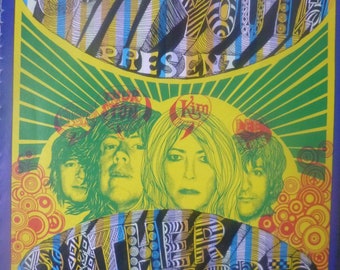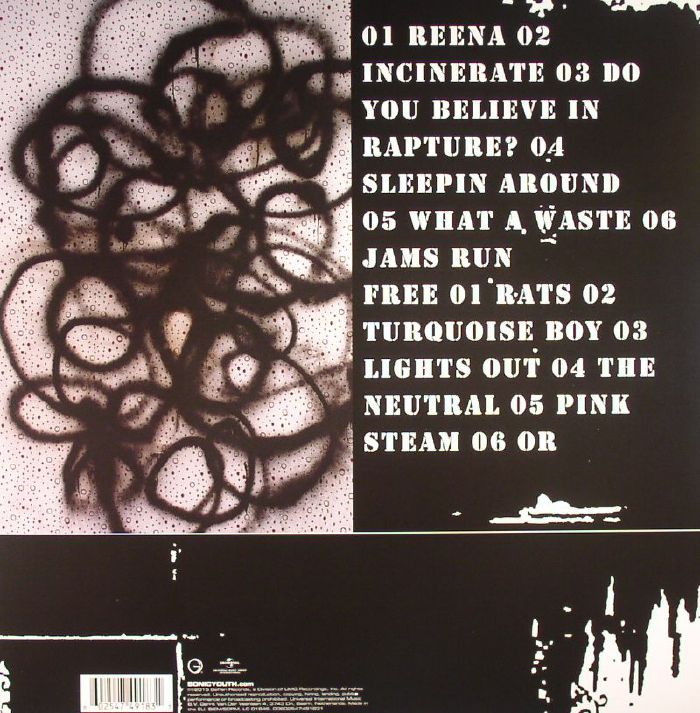He's right: Sonic Youth needn't bother impressing folks at this point. That history can also work against them, but it's boring to parade out each classic and see just how Rather Ripped stacks up to it. So, hey, let's just say it's great to hear Kim, Lee, Steve, and Thurston making an album that sounds beautifully invigorated and goes down.
Latest album from the legendary NYC band is also its tautest, a record full of propulsive, three-minute art-pop songs.
The title of Sonic Youth's newest album references a defunct Berkeley, Calif., record store, but it's also a fitting description for the band's tautest set in 25 years. As the militaristic stencils on the cover suggest, these 12 tracks add up to one super chiseled physique; critics needn't exaggerate Rather Ripped's concision, though, Sonic Youth manage to sneak in all sorts of noisy accents, oddball tunings, and crescendo transitions into their so-called pop record.
That, and it's a grower. After my initial runs through, I appreciated the pristine guitar sound, but the majority of the songs felt boring (over time hooks bloomed). Yet it also proves that New York's premier avant-garde group can write catchy tunes without dipping too deeply into its bag of cracked guitar tricks. Doused with sleek and slippery riffs, the album's early succession of propulsive, three-minute art-pop songs is especially strong.
The other most striking aspect of the album is that there are more Kim Gordon tracks than on most recent outings. She makes good use of the face time, turning in her best work since 'Kissibility' and 'Kool Thing'. On 'Reena' she reminds someone, presumably husband/bandmate Thurston Moore, that 'you keep me coming home again,' despite her, uh, intense friendship with another woman. Both it and her 'Turquoise Boy' feature brief Glenn Branca-like breakdowns before returning to Lee Ranaldo and Moore's shiny guitar playing. On the slinky 'Jams Run Free', Gordon breathily intones, 'We love the jams.' Rather Ripped has plenty of those.

Moore's first vocal turn comes on the catchy slip'n'slide single 'Incinerate.' Not an update of Big Black's 'Kerosene', it may be a love song with over-cooked metaphors or perhaps some actual immolation: 'I ripped your heart of your chest/ Replaced it with a grenade blast...you dosed my soul with gasoline/ You flicked a match into my brain.'
The strongest track is 'Do You Believe in Rapture'. Set against a backwash of noise, 16-carat 'Bull in the Heather' strums, and the coupling of a lightly thumping drum machine with Steve Shelley on the real deal, it feels like Daydream Nation's piano burning 'Providence' turned inside out by Yo La Tengo. Out of nowhere (or maybe out of one guitar strand), it shifts into pop prettiness.
Sonic Youth Rather Ripped Rare Candy
Somewhere just after the middle of the album, things loose a little oomph, especially on ho-hum tour-diary closer 'Or'. (Though some of its spare sound does echo 'Do You Believe in Rapture'.) On it, Moore begins by describing a girl with 'canisters of whipped cream' in her 'sweater pockets' and ends recounting various fan questions, culminating with the queries: 'What comes first? The music or the words?' On this one, it was hopefully the music. There are a couple late-stage keepers: 'The Neutral's crystalline guitar parts drop like snow (again, it's a Kim track) and the longer 'Pink Steam', a slow-build Moore lust song, is gorgeously windswept and violently romantic.
The latter brings up something important: 'Pink Steam's named after a great collection of diaristic essays, confessional memoirs, and literary tidbits by San Francisco author Dodie Bellamy. I didn't need to look that one up but as a kid, I used Sonic Youth lyrics and liner notes as reading lists-- they led me to Gerhard Richter, Mike Kelley, Richard Kern, Raymond Carver, d.a. levy, and more. They've always been important for bringing downtown NYC's overlapping traditions of art/music/literature to punk kids. Go back to those early records to check out who did the art work for them and read the thank you's. Pre-internet, this was the way to get an underground education.
Sonic Youth Rather Ripped Full
Talking to Moore recently for Pitchfork, he said noise's popularity and accessibility seems as a good reason as any to create a relatively noise-free album. He's right: Sonic Youth needn't bother impressing folks at this point. That history can also work against them, but it's boring to parade out each classic and see just how Rather Ripped stacks up to it. So, hey, let's just say it's great to hear Kim, Lee, Steve, and Thurston making an album that sounds beautifully invigorated and goes down smoothly.
Back to homeSonic Youth have always had an eccentric taste for melody, but they’ve rarely indulged it as blatantly as they do on Rather Ripped. Damn if these grizzled art-punk elders aren’t trying to make a pop album a good fifteen years after that would have made any commercial sense. Most of the twelve tunes hover around the four-minute mark, cleanly produced, with a downright sentimental tone. There’s hardly any of the Youth’s famous feedback, and none of the embarrassing beat-poetry interludes that clogged up their last few albums. Kim Gordon sounds like she might even mean it when she sings, “What a waste/You’re so chaste/I can’t wait to taste your face.”

In principle, this is a sketchy idea, since Sonic Youth are better at meandering and atmospherizing than verse-chorus-verse. Concise and catchy has never been their thing. In practice, however, Rather Ripped is an excellent record, one of the strongest to emerge from Sonic Youth’s amazing late period. Thurston Moore dominates, singing six of the songs, and it has the same vibe as his 1995 solo gem, Psychic Hearts: The guitars ring out with a sense of emotional urgency, as if he has something incredibly important to say to some girl who’s standing incredibly close, and he doesn’t have time to diddle around about it. So in highlights like “Incinerate” and “Pink Steam,” he gets out of the way and lets his guitar communicate live and direct.
Once upon a time, Sonic Youth summed up the loftiest aspirations of Eighties indie rock with Daydream Nation, the 1988 headphone opus where they made fun of art-rock excess and reveled in it at the same time. Daydream Nation sounded like a vision of the future, yet the Youth never dared to follow it up, and neither did anybody else. They marked time in the Nineties with drab, quasi-heavy records, but they’ve been on a creative roll ever since A Thousand Leaves, in 1998, where they let themselves get spacey again. In the past decade, they’ve made two masterful albums (Leaves and Murray Street), one real good one (Sonic Nurse), one real bad one (NYC Ghosts and Flowers) and a prolific spew of fans-only experiments. Not too shabby when you consider the core trio — Moore, Gordon and Lee Ranaldo — have been sonic since 1981. (Wags still crack that they’re not youths anymore — but that joke is old enough to vote, cowboy.)
Rather Ripped continues the winning streak, without sounding all that much like any of the others. The Youth have stripped back down to a quartet, after six years with Jim O’Rourke. (Poor Steve Shelley: back to being the “new guy,” after drumming for the band only since 1985.) The premise is the melodic guitar sparkle of Youth classics like “Bull in the Heather,” “Wildflower Soul” and “The Diamond Sea.” But the songs aren’t slow or quiet; the guitars ripple to build tension, as in the moody Pavement-style five-minute jam that opens “Pink Steam.” Unfortunately, Ranaldo keeps a low profile here, contributing only the so-so “Rats.” The big surprise is Gordon: After cracking MTV with “Kool Thing,” she came down with a sad case of rock-star importance and began coasting on her fame with cloying spoken-word showpieces —hence albums like A Thousand Leaves, where the five worst songs are the five she sings. But Rather Rippedhas her first worthwhile tunes in a decade or so. She and Moore trade off breathy love-song vocals, with Gordon sounding great in the six-minute farewell ballad “Turquoise Boy,” the hippie fantasy “Jams Run Free” and the oddly touching “The Neutral,” where she pleads, “Why won’t you tell me what’s inside your head?/Why won’t you show me your secret bed?” Rather Ripped suggests that if Sonic Youth keep thriving, their glorious Eighties run could end up sounding like a mere prelude to their present-day music.